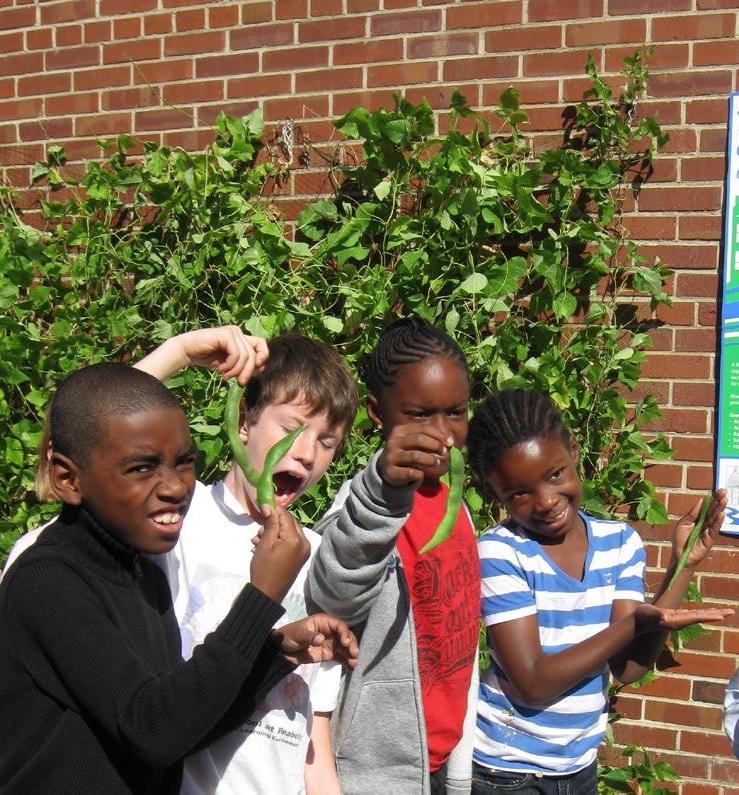
3 minute read
GREENliving
New School Garden Guide Encourages Garden-based Learning in DC Schools
By Molly Cuddy
School gardeners picking peas and beans at the Watkins Elementary School on Capitol Hill in Washington, DC.
The United States Botanical Garden (USBG) has partnered with the Office of the State Superintendent (OSSE) and City Blossoms to promote garden-based learning in DC schools with a guide that goes in-depth about garden upkeep. “Growing Strong: A Comprehensive Guide to Support all School Garden Programs in the District” was released as a celebration for Earth Day 2021. The guide is meant for teachers, administrators, and parents to give students in the District a chance to learn about gardening, and also to apply what they’re learning in school to the outdoors. Research shows that gardening is extremely beneficial and has a major positive impact on students, which is a huge reason why the guide was created. In addition to the effects on students, gardening also benefits the community and the District as a whole. This manual was in the works for more than 10 years, according to Ray Mims, USBG Partnerships and Sustainability Specialist, and Lee Coykendall, a Senior Children’s Education Specialist. The USBG had partnered with OSSE and City Blossoms on past projects, such as a Greenhouse Manual for educators, and knew the partnership worked well. City Blossoms is a nonprofit organization that specializes in creative programming in kid-driven gardens. They have been providing children and students with gardening spaces since 2008, focusing especially on kids who may not have access to a garden space otherwise. Mims and Coykendall “decided that an online manual could be a rich resource for the D.C. school community and DMV area,” according to Coykendall and Mims. “This is serving a need that has been known about within DC schools. For years, schools reached out to USBG with school garden questions,” said Coykendall and Mims, “We would answer and provide support as we were able, but we did not have as much staff capacity as we would have liked to help with this topic.” The guide allowed for all of this information to be in one place, as well as easily accessible. The guide is available on USBG’s website for anyone who may want to access it. According to the website page, it will help with “starting a new school garden, maintaining an existing school garden, and providing highquality-based instruction.” The guide is just 21 pages long and provides plenty of information, going in-depth about starting a garden and being able to help a garden continue to flourish. Several color photos of real students taking advantage of gardens are scattered throughout the guide. It also includes several references and resources that could be used for researching even more tips and tricks for school gardens. “This guide is an important document that lays a path for establishing a sustainable and impactful school garden program,” Tara McNerney, executive director of City Blossoms, said. Both Mims and Coykendall said they hope the guide can provide educators with correct and consistent information about starting or teaching in a garden. “We are very proud to offer this resource to area educators.” The pandemic deprived students of in-person socializing, as well as valuable time spent outdoors. It’s important that students are able to connect with their friends and other students, and the garden is a great place to do that safely. Although students were out of school for a long period of time, they are slowly returning to the classroom— and the garden. “Gardens are amazing outdoor spaces and classrooms,” Mims and Coykendall said, “Now more than ever, with students coming back to schools, it is important to connect students to the outdoors.” You can check out the school garden guide on USBG’s website or use this direct link: https://www.usbg.gov/ schoolgardenguide. o
Molly Cuddy is a journalism major at the University of Maryland, College Park, and an intern this summer with Washington Gardener. She is also a campus tour guide and will be a teaching assistant for a professional writing class next semester.










